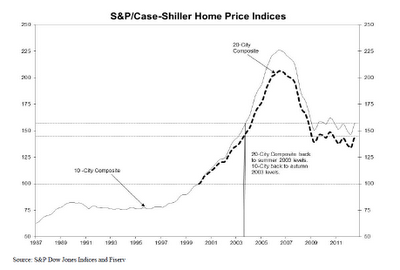Vital Statistics:
|
Last |
Change |
Percent |
| S&P Futures |
1431.7 |
5.3 |
0.37% |
| Eurostoxx Index |
2521.7 |
-6.8 |
-0.27% |
| Oil (WTI) |
96.72 |
0.2 |
0.19% |
| LIBOR |
0.399 |
-0.006 |
-1.36% |
| US Dollar Index (DXY) |
80.23 |
-0.172 |
-0.21% |
| 10 Year Govt Bond Yield |
1.68% |
0.02% |
|
| RPX Composite Real Estate
Index |
193.1 |
0.2 |
|
Markets are stronger this morning after the government sold a stake in AIG and the National Federation of Independent Businesses noted an increase in optimism. Deutsche Bank is looking to cut $6 billion in expenses by 2015. The trade deficit shrunk from 44B to 42B. Bonds are up 7 ticks, while MBS are down a couple.
The National Federation of Independent Business released their
Small Business Optimism Report for September, which showed improvement, but is still solidly in recession territory. On the positive side, hiring plans are the best they have been in years; but on the negative side, they aren't hiring now. It also weighs in on QE, asking the obvious question: "Is anyone not hiring because interest rates are too high?" They also note that "political uncertainty" is at a new high - 22% of respondents cited that as a reason they are sitting on their hands. That said
some pizza parlor owners must be doing okay.
Chart: NFIB Small Business Optimism Index:
Fannie's first sale of REO-to-Rentals
traded at 96% of BPO. That is an eye-popping number, given that distressed pools have been trading in the mid / high 60s, but this is an oddball transaction - the buyer (Pacifica) will participate in a JV with Fannie, will put up under 16% of the purchase price, manage the properties, split the cash flows with Fannie and will receive a management fee. It seems odd that Fannie is basically buying properties from itself - Pacifica puts up 12.3MM, while Fannie puts up the rest. Let me guess, there is a mark-to-market angle here...
FHFA and F&F have launched a
new Reps and Warranties framework for conventional loans sold after Jan 1. Put-Back risk - the risk that the government could come after you and force you to re-purchase a loan if the borrower starts missing payments - has been weighing on mortgage bankers and explains why banks have put such stringent overlays on F&F loans. The government will release banks from this requirement if the loan pays consistently for 36 months. For HAMP loans, it will be 12 months. Co-incidentally,
Congress has a re-introduced a bill to expand HARP refis which may contain language regarding the Qualified Mortgage safe harbor provision. The QM has been a big source of uncertainty for lenders. Finally specifying what constitutes are qualified mortgage could go a long way towards getting mortgage credit flowing again.
Redwood is
doing another deal - $312 million of jumbos - the 9th deal since the market froze in 2008. Only 9 jumbo securitizations in 4 years. Probably $2 billion in total. To put that number in perspective, non-agency deals topped 1.2 trillion in 2004 and 2005.










